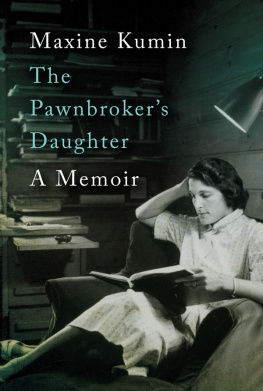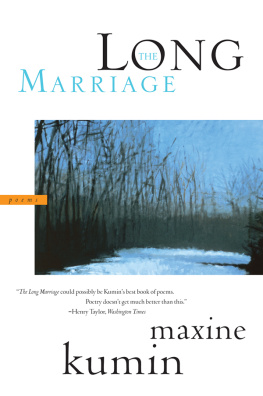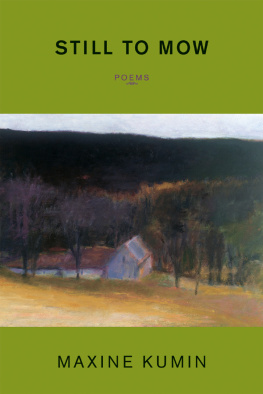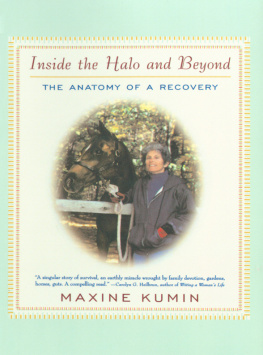
The
Pawnbrokers
Daughter
A Memoir
Maxine Kumin

Adjusting type size may change line breaks. Landscape mode may help to preserve line breaks.

Maxine at age four on the boardwalk in Atlantic City, New Jersey. Kumin Family Photo
for Victor
The
Pawnbrokers
Daughter
Need Money? See Pete.
Recollections by the
Pawnbrokers Daughter

Maxine and her father, Peter Winokur Sr., on her wedding day, June 29, 1946. Kumin Family Photo
W hen I was growing up in the 1930s, the first four words I learned to read were Need money? See Pete . In that era of carefree smoking, every pack of cigarettes in greater Philadelphia came with a free matchbook, many of them adorned, front and back, with these words. My father Peter owned the biggest pawnshop in the city. He had inherited it from his father, Max Winokur, for whom I was named. According to my oldest brother, Grandfather had first owned a shirt factory until, at the end of World War I, his workers had demanded the right to form a union and when he refused went out on strike. Rather than accede, Grandfather shut the enterprise down. After several lean months he bought a foundering store in the heart of the ghettoized black section of South Philadelphia and named it Federal Loan.
A funny mixture of sybarite and Calvinist, my father left school at the age of thirteen in order to help in the store while his older brother Joseph became the family scholar. Joseph went on to college and law school at the University of Pennsylvania, but despite the degrees he earned, he was never financially successful. Behind the scenes, my father, who was devoted to his older brother, made up the difference. Im sure this contributed to the tension that escalated between the brothers wives.
I was aware from an early age how different my mothers upbringing was from my aunts. Aunt Bea, an only child, grew up in Berlin and Paris. Sixth in a family of twelve children, my mother grew up in Radford, Virginia, a small town where her father owned the general store. When she could be induced to talk about it, her story was an idyll of chickens and rabbits, a family pony, and her fathers matched pair of Saddlebreds that he drove in harness.
Music teachers came and went in Radford; my mother, who had shown a precocious ability to pick out tunes on the family upright, took lessons from the time she could sit on the piano bench. She was fifteen when the Methodist church organist moved away. Although they were the only Jewish family in Radford, she became the official church organist with her fathers permission. In addition to Sunday services, she also played for all the church weddings and funerals. When, at eighteen, she came to Philadelphia to live with an older married sister, she enrolled at the Coombs Conservatory of Music. Although unspoken, it was clearly hoped that she would find an appropriate Jewish husband.
She and my father met at a Saturday night party in the suburbs. She was playing the piano when my father burst in jovially and had to be shushed so that the concert could continue. Who is this haughty dame? my father is said to have inquired, while my mother glared in his direction. It didnt seem a propitious beginning, but they eloped the following year. Four of us children arrived at explicit three-year intervals. The only girl, I was the last of the line, alternately cosseted and resented by my brothers. I was also the only child born in the house on Carpenter Lane, which my parents had bought just a few months before my birth in June 1925.
The house was a spacious three-story Georgian colonial, built in 1895 next to the commodious property of the convent of the Sisters of St. Joseph, a teaching order. Our house perched on top of two sets of stairs leading to a wide brick terrace. A broad hall opened to a living room, a music room containing my mothers Steinway, a dining room, breakfast room, large kitchen, pantry, and laundry. Upstairs there were five bedrooms and three baths.
At the age of five, over my fathers mild objections, my mother sent me next door to the nuns to attend their kindergarten. It was immensely convenient; I ducked through a gap in the privet hedge and managed to arrive at my place in line (we were sized by height) before the bell had stilled. Moreover, I felt very much at home in the convent, as I had been a frequent guest on Sundays after Mass, when the sisters enjoyed a lovely brunch. The mother superior of the order, Mother Rosarine, spoiled me outrageouslyI heard this repeated at home, almost dailyand I usually sat on her lap at the table. Because the public school was a mile away (this was before the era of yellow buses), my attendance continued at the convent through second grade, at which time the crucifixion of Jesus became as much an issue for me as animal cruelty. No matter that I was told on our side of the hedge that the Romans had done that to Him. On the other side, quite matter-of-factly and without casting blame on my innocent state, it was the Jews who had fastened Him to the Cross. A larger-than-life-size crucifix hung in the main corridor of the schoolroom; daily there was no escaping this piteous sight.
The Jesuits are reputed to say, Give us a child until he is eight and he will be ours always. I was deeply touched by my early experience at convent school, but the final effect of my bifurcated religious education was quite simply to feed my skepticism. Jesus became for me a symbol of goodness and humility that I never quite relinquished, a very human figure in an otherwise mysterious faith full of saints available for special intercessions.
The year I moved to public school, my middle brother Herbert came down with a virulent case of pneumonia that did not respond to any of the usual treatments. A pair of nuns from next door came every day at sundown to pray at his bedside until daybreak. Meanwhile, the doctor, in desperation, prescribed a new medication called sulfanilamide that was just coming into use in Europe and North America. Herbert made a rapid recovery, whether due to science or divine intervention.
Despite the presence of the sisters in their long black gowns and starchy white wimples, Germantown then was largely an upper-middle-class Protestant suburb. Several Jewish families, even some not related to us, had also invaded the precinct.
To be a Jewish child in Germantown in the thirties was sometimes difficult. On bad days, older kids chased us downhill from school yelling Christ-killer! In class, a schoolmate might mutter I dont want to sit next to a Jew. Among adults there was an omnipresent but invisible line that divided Jews from non-Jew-hating Christians. Both of my parents spoke with pride of their good Christian friends. But it was clear that this level of friendship differed from friendships within the brotherhood. There were things they didnt say in front of the Gentiles. There were in-group jokes, sprinkled with yiddishisms, which could only be told in the right company, and there were tacit admissions of abhorrent traits. My mother, for example, was driven wild by any of us gesticulating in the course of a conversation. Dont talk with your hands! she hissed. You look like an immigrant. Until I was in my teens I believed that only Jews used gestures or stood close enough to breathe on each other as they conversed.
Next page









